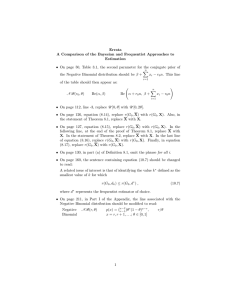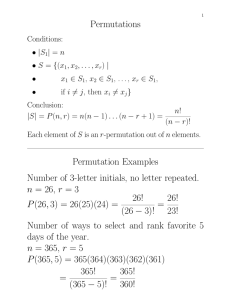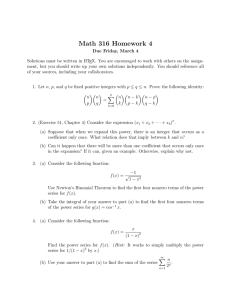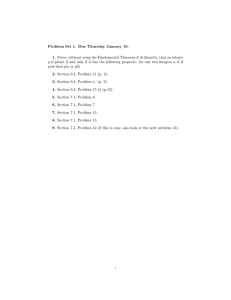1. If I could change one thing Among things that I am capable of
advertisement
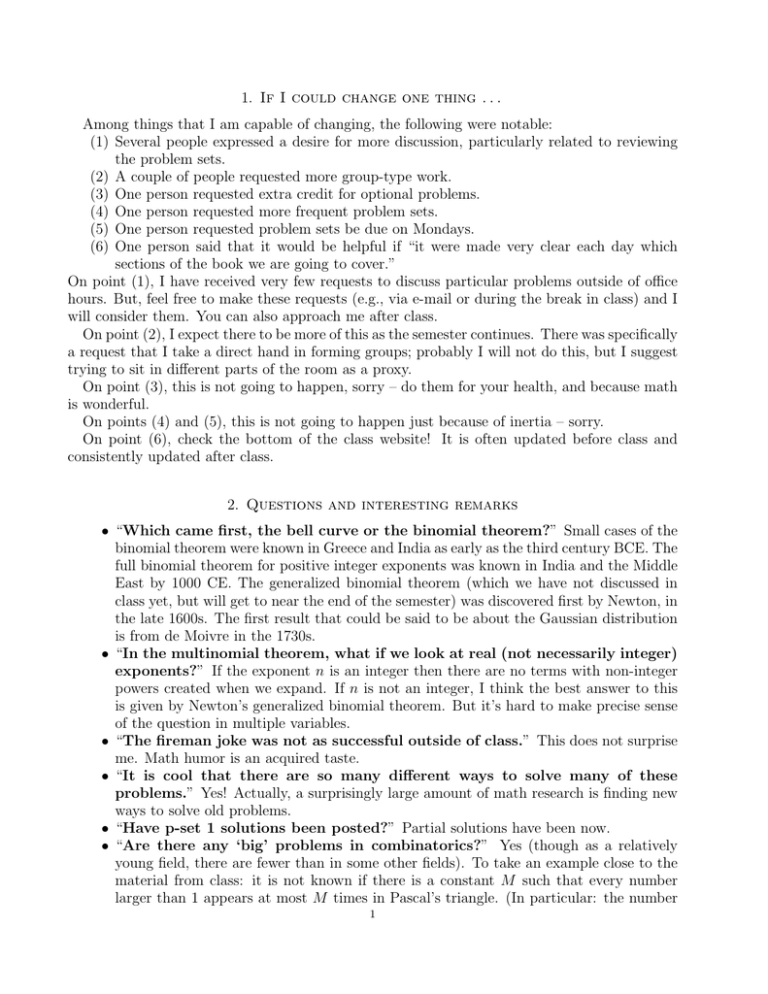
1. If I could change one thing . . . Among things that I am capable of changing, the following were notable: (1) Several people expressed a desire for more discussion, particularly related to reviewing the problem sets. (2) A couple of people requested more group-type work. (3) One person requested extra credit for optional problems. (4) One person requested more frequent problem sets. (5) One person requested problem sets be due on Mondays. (6) One person said that it would be helpful if “it were made very clear each day which sections of the book we are going to cover.” On point (1), I have received very few requests to discuss particular problems outside of office hours. But, feel free to make these requests (e.g., via e-mail or during the break in class) and I will consider them. You can also approach me after class. On point (2), I expect there to be more of this as the semester continues. There was specifically a request that I take a direct hand in forming groups; probably I will not do this, but I suggest trying to sit in different parts of the room as a proxy. On point (3), this is not going to happen, sorry – do them for your health, and because math is wonderful. On points (4) and (5), this is not going to happen just because of inertia – sorry. On point (6), check the bottom of the class website! It is often updated before class and consistently updated after class. 2. Questions and interesting remarks • “Which came first, the bell curve or the binomial theorem?” Small cases of the binomial theorem were known in Greece and India as early as the third century BCE. The full binomial theorem for positive integer exponents was known in India and the Middle East by 1000 CE. The generalized binomial theorem (which we have not discussed in class yet, but will get to near the end of the semester) was discovered first by Newton, in the late 1600s. The first result that could be said to be about the Gaussian distribution is from de Moivre in the 1730s. • “In the multinomial theorem, what if we look at real (not necessarily integer) exponents?” If the exponent n is an integer then there are no terms with non-integer powers created when we expand. If n is not an integer, I think the best answer to this is given by Newton’s generalized binomial theorem. But it’s hard to make precise sense of the question in multiple variables. • “The fireman joke was not as successful outside of class.” This does not surprise me. Math humor is an acquired taste. • “It is cool that there are so many different ways to solve many of these problems.” Yes! Actually, a surprisingly large amount of math research is finding new ways to solve old problems. • “Have p-set 1 solutions been posted?” Partial solutions have been now. • “Are there any ‘big’ problems in combinatorics?” Yes (though as a relatively young field, there are fewer than in some other fields). To take an example close to the material from class: it is not known if there is a constant M such that every number larger than 1 appears at most M times in Pascal’s triangle. (In particular: the number 1 2 • • • • • 3003 appears 8 times in Pascal’s triangle; it is not known if any number appears more than 8 times.) “Will the problems on the exam be as hard as the ones in class?” and “How many of the specific things we go through in class should we be proficient in for the exam?” I don’t quite know how to answer these questions. On exams, I draw at will from material discussed in class, on problem sets, or in the relevant sections of the text. My goal for the exams is a spread of problem difficulties, with a total amount of work that a typical member of the class can finish in the allotted time. I hope that you understand both the fabric of logic that goes into proving the results we discuss in class, and how to use them to solve related problems. “Could you explain more about multichoose?” Yes. Talk to me after class, in break, or in office hours. “If you were a plant, what kind of plant would you be?” I have always liked black oaks, but with no specific justification. “What are some common mistakes to avoid?” This is too big a question; I try to point these out in class when I think of them. Also, this is what p-sets are for. “What is your favorite movie?” Maybe Casablanca? The worst movie I’ve ever seen was G.I. Joe: The Rise of Cobra.
